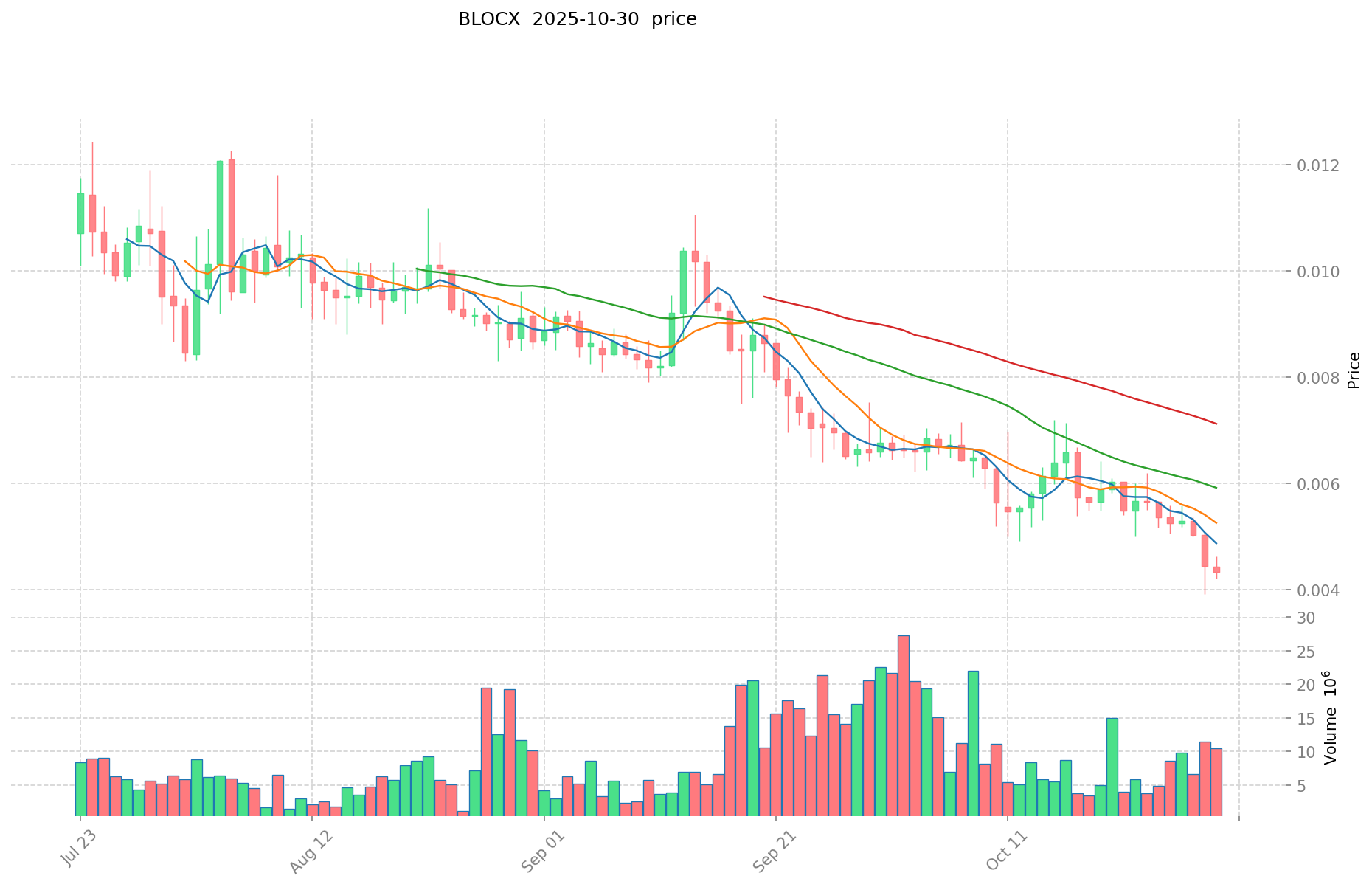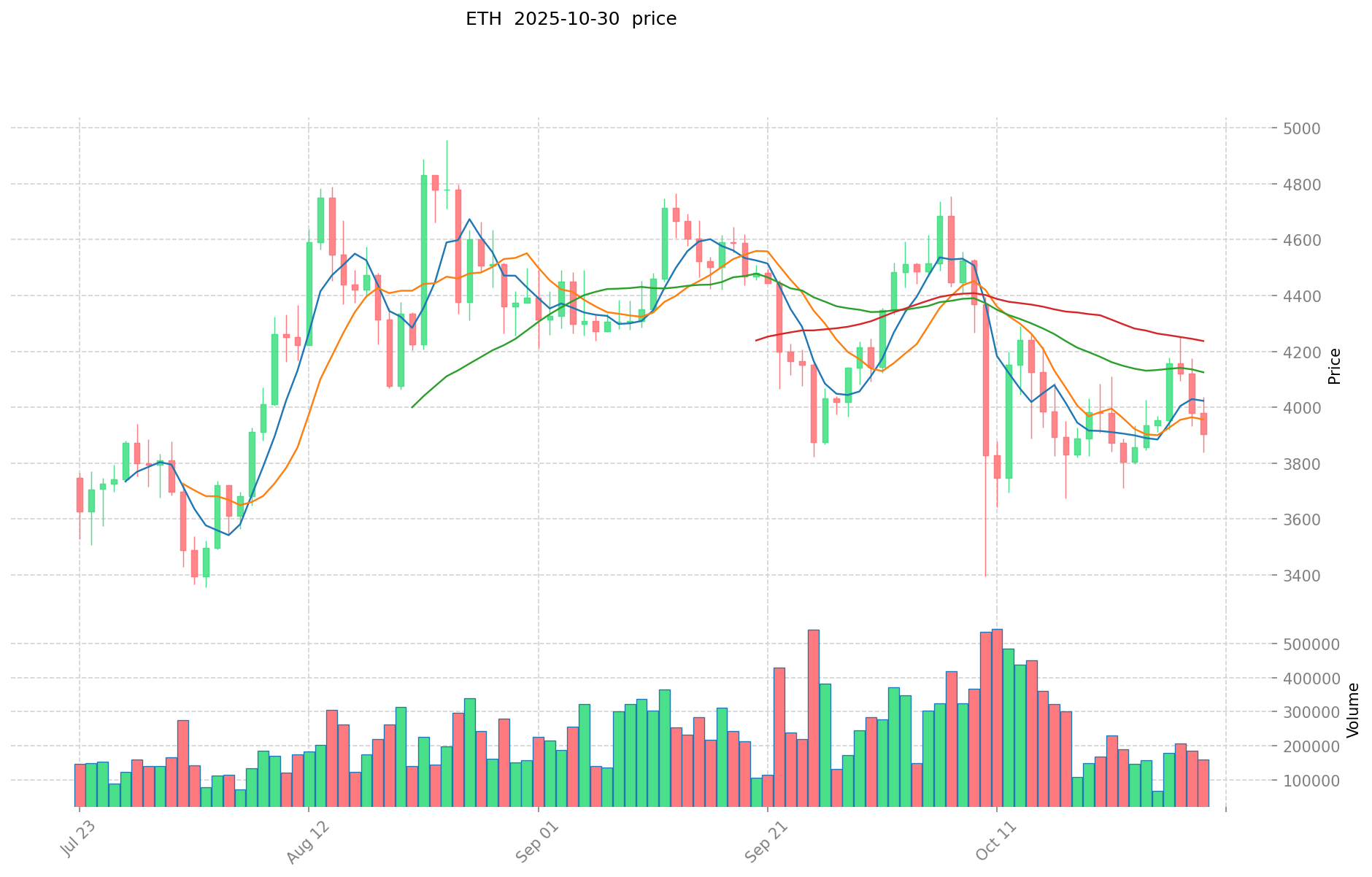BLOCX vs ETH: The Battle for Blockchain Supremacy in the Decentralized Future
Introduction: BLOCX vs ETH Investment Comparison
In the cryptocurrency market, BLOCX vs ETH comparison has always been a topic that investors can't avoid. The two not only have significant differences in market cap ranking, application scenarios, and price performance, but also represent different cryptocurrency asset positioning.
BLOCX (BLOCX): Since its launch, it has gained market recognition for its all-in-one desktop computer manager integrating Web 2.0 and Web 3.0 features.
Ethereum (ETH): Since its inception in 2015, it has been hailed as a decentralized, open-source blockchain platform, and is one of the cryptocurrencies with the highest global trading volume and market capitalization.
This article will comprehensively analyze the investment value comparison between BLOCX and ETH, focusing on historical price trends, supply mechanisms, institutional adoption, technological ecosystems, and future predictions, and attempt to answer the question that investors care about most:
"Which is the better buy right now?"
I. Price History Comparison and Current Market Status
BLOCX and ETH Historical Price Trends
- 2024: BLOCX reached its all-time high of $0.28995 on March 9, 2024.
- 2025: ETH achieved its all-time high of $4,946.05 on August 25, 2025.
- Comparative Analysis: In the current market cycle, BLOCX has fallen from its high of $0.28995 to $0.00369, while ETH has shown more resilience, currently trading at $3780.38 after reaching its peak.
Current Market Situation (2025-10-31)
- BLOCX current price: $0.00369
- ETH current price: $3780.38
- 24-hour trading volume: $38,367.51 (BLOCX) vs $745,892,817.96 (ETH)
- Market Sentiment Index (Fear & Greed Index): 34 (Fear)
Click to view real-time prices:
- Check BLOCX current price Market Price
- Check ETH current price Market Price


Comparative Analysis of BLOCX and ETH Investment Value Fundamentals
Supply Mechanism Comparison (Tokenomics)
- BLOCX: Limited information available on specific tokenomics; current value approximately 0.01997 SAR with exchange rates reflecting market demand
- ETH: Features a dynamic supply model with staking incentives; significant portion of ETH supply locked in staking (approximately $32 billion worth)
- 📌 Historical Pattern: ETH's value is partially derived from network activity driving demand for block space, generating cash flow for token holders
Institutional Adoption & Market Applications
- Institutional Holdings: ETH has significant institutional presence with Lido controlling 75% of staked ETH (worth over $24 billion)
- Enterprise Usage: ETH has widespread adoption across DeFi protocols and applications, creating sustainable demand
- Regulatory Environment: Limited information available on specific regulatory differences between the assets
Technical Development & Ecosystem Building
- ETH Technical Development: Ethereum network activity directly influences token value by creating demand for block space
- Ecosystem Comparison: ETH benefits from extensive DeFi integration, with staking mechanisms creating substantial locked value
Macroeconomic Factors & Market Cycles
- Inflation Hedge Properties: ETH demonstrates value capture through network activity and cash flow generation
- Market Demand Drivers: BLOCX value appears primarily driven by trading volume and market demand, while ETH derives value from both utility and financial mechanisms
- Market Dynamics: ETH staking represents a significant economic activity with $32 billion committed to the protocol
III. 2025-2030 Price Prediction: BLOCX vs ETH
Short-term Prediction (2025)
- BLOCX: Conservative $0.00217 - $0.00374 | Optimistic $0.00374 - $0.00535
- ETH: Conservative $2680.69 - $3775.62 | Optimistic $3775.62 - $4606.26
Mid-term Prediction (2027)
- BLOCX may enter a growth phase, with prices estimated at $0.00460 - $0.00675
- ETH may enter a consolidation phase, with prices estimated at $3277.73 - $6158.16
- Key drivers: Institutional capital inflow, ETF, ecosystem development
Long-term Prediction (2030)
- BLOCX: Base scenario $0.00679 - $0.00875 | Optimistic scenario $0.00875 - $0.00875
- ETH: Base scenario $3972.35 - $6305.32 | Optimistic scenario $6305.32 - $7944.71
Disclaimer
BLOCX:
| 年份 | 预测最高价 | 预测平均价格 | 预测最低价 | 涨跌幅 |
|---|---|---|---|---|
| 2025 | 0.0053482 | 0.00374 | 0.0021692 | 1 |
| 2026 | 0.005680125 | 0.0045441 | 0.00318087 | 23 |
| 2027 | 0.0067479885 | 0.0051121125 | 0.00460090125 | 38 |
| 2028 | 0.007056760095 | 0.0059300505 | 0.003498729795 | 60 |
| 2029 | 0.007077811774275 | 0.0064934052975 | 0.0036363069666 | 75 |
| 2030 | 0.008753435011294 | 0.006785608535887 | 0.005292774657992 | 83 |
ETH:
| 年份 | 预测最高价 | 预测平均价格 | 预测最低价 | 涨跌幅 |
|---|---|---|---|---|
| 2025 | 4606.2564 | 3775.62 | 2680.6902 | 0 |
| 2026 | 5741.585334 | 4190.9382 | 2556.472302 | 10 |
| 2027 | 6158.16459108 | 4966.261767 | 3277.73276622 | 31 |
| 2028 | 6563.4115512672 | 5562.21317904 | 4950.3697293456 | 47 |
| 2029 | 6547.837354365888 | 6062.8123651536 | 3698.315542743696 | 60 |
| 2030 | 7944.70932329727744 | 6305.324859759744 | 3972.35466164863872 | 66 |
IV. Investment Strategy Comparison: BLOCX vs ETH
Long-term vs Short-term Investment Strategies
- BLOCX: Suitable for investors focused on emerging technologies and potential ecosystem growth
- ETH: Suitable for investors seeking established networks with strong DeFi integration and institutional adoption
Risk Management and Asset Allocation
- Conservative investors: BLOCX: 10% vs ETH: 90%
- Aggressive investors: BLOCX: 30% vs ETH: 70%
- Hedging tools: Stablecoin allocation, options, cross-currency portfolios
V. Potential Risk Comparison
Market Risk
- BLOCX: Higher volatility due to lower market cap and trading volume
- ETH: Susceptible to broader crypto market trends and macroeconomic factors
Technical Risk
- BLOCX: Scalability, network stability
- ETH: Concentration of staking power, potential security vulnerabilities
Regulatory Risk
- Global regulatory policies may have differing impacts on both assets
VI. Conclusion: Which Is the Better Buy?
📌 Investment Value Summary:
- BLOCX advantages: Potential for higher growth, innovative all-in-one desktop computer manager
- ETH advantages: Established ecosystem, strong institutional adoption, staking incentives
✅ Investment Advice:
- New investors: Consider a larger allocation to ETH for stability, with a small position in BLOCX for growth potential
- Experienced investors: Balanced portfolio with both assets, adjusting based on risk tolerance
- Institutional investors: Focus on ETH for its established market presence and liquidity
⚠️ Risk Warning: The cryptocurrency market is highly volatile. This article does not constitute investment advice. None
VII. FAQ
Q1: What are the main differences between BLOCX and ETH in terms of investment potential? A: BLOCX is a newer asset with potential for higher growth, offering an all-in-one desktop computer manager integrating Web 2.0 and Web 3.0 features. ETH is a more established cryptocurrency with a larger market cap, extensive DeFi integration, and strong institutional adoption. ETH also offers staking incentives and has a more developed ecosystem.
Q2: How do the current market prices of BLOCX and ETH compare? A: As of October 31, 2025, BLOCX is priced at $0.00369, while ETH is trading at $3780.38. ETH has shown more resilience in maintaining its value compared to its all-time high, while BLOCX has experienced a more significant decrease from its peak.
Q3: What are the long-term price predictions for BLOCX and ETH? A: For 2030, BLOCX's base scenario predicts a range of $0.00679 - $0.00875, with an optimistic scenario reaching $0.00875. ETH's base scenario for 2030 is $3972.35 - $6305.32, with an optimistic scenario of up to $7944.71.
Q4: How do the supply mechanisms of BLOCX and ETH differ? A: While specific information on BLOCX's tokenomics is limited, ETH features a dynamic supply model with staking incentives. A significant portion of ETH's supply (worth approximately $32 billion) is locked in staking, which influences its value and scarcity.
Q5: What are the key risks associated with investing in BLOCX and ETH? A: BLOCX faces higher volatility due to its lower market cap and trading volume, as well as potential scalability and network stability issues. ETH is susceptible to broader crypto market trends and macroeconomic factors, with risks related to the concentration of staking power and potential security vulnerabilities.
Q6: How should investors allocate their portfolios between BLOCX and ETH? A: Conservative investors might consider allocating 10% to BLOCX and 90% to ETH, while more aggressive investors could opt for a 30% BLOCX and 70% ETH split. New investors may want to focus more on ETH for stability, while experienced investors might balance their portfolios based on individual risk tolerance.
Share
Content